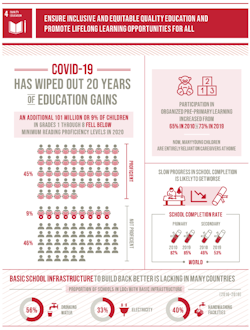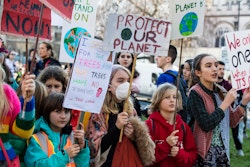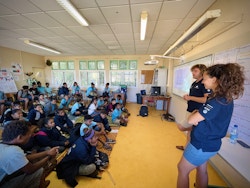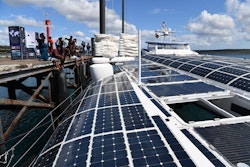Changing course, transforming education
Never in the history of humanity, has the entire world population had to face not one, but two planetary crises. Anywhere across the world today, the effects of the pandemic, highly intertwined with the impacts of climate change, are vividly exacerbated.
The solving of these crises and the ensuring of a prosperous future for generations to come will require a joint effort of all nations. For the 2022 International Day of Education, let's discover more about what's at stake with Katia Nicolet, scientist onboard Energy Observer.

Visit of students onboard Energy Observer in New Caledonia
Widening inequalities
Over the past two years, the pandemic has heightened inequalities between the wealthy and the poor. Before Covid-19's worldwide breakout, poverty had been steadily decreasing throughout the world, and significant progress had been made on most of the United Nations’ 17 Sustainable Development Goals.
However, estimates by the United Nations suggest that in 2020, between 119 and 124 million more people fell under the “extreme poverty” line because of the pandemic, affecting women and youth disproportionately. Meanwhile, the ten richest men in the world saw their wealth double on average over the past two years.
“The time has come to reignite our collective commitment to education.”

Sustainable development goals
Covid-19 impacting education
The closure of schools, further impacting the younger generations and the less wealthy, was yet another drastic impact triggered by the pandemic. While high-income households could pursue their education online using digital technologies, struggling families did not have this opportunity.
In Uganda, 15 million students were unable to attend school for almost two years, which undeniably impacted their education forever.
“Education is the most powerful weapon which you can use to change the world.”
Time to shift
Thus, this year’s theme for the International Day of Education is: “Changing Course, Transforming Education.” Today, 258 million children and youth do not attend school, and 617 million children and adolescents cannot read or do basic math. The right to education is a human right. Therefore, its violation is simply unacceptable.
To shift the current situation, the system upon which education, and its mindset, rely needs to change. Technology needs to be used as a tool to reduce learning gaps between children, instead of widening them. But infinite technological growth on a finite planet is not sustainable.
Therefore, it is time for sustainable development and environmental protection to be implemented at the core of one’s education. But how can new technology support both humans and nature? How can we change the system for the better; allowing for an equal, just, and prosperous future for generations to come, without destroying our only home, the earth?
Our faith in youth
At its level of outreach and influence, Energy Observer seeks to invent, test, optimize and provide safe and clean technologies in the energy sector.

Climate march in central London - 2019
The hydrogen system developed by the project has far-reaching applications from land and sea transport to energy access in remote locations. We believe that hydrogen can become a vector for sustainable energy systems anywhere, with a much lower ecological impact than its fossil-fuels counterparts. Starting with the GEH2®, the electro-hydrogen generator developed by EODev and that can be used as a clean back-up power instead of diesel generators.

School visit in New Caledonia
Imagine a world where schools in remote rural villages could run on renewable energies and hydrogen, allowing every student to access the world’s knowledge and actively contribute to its enrichment.
This future is possible, and we must start building it now, with clean and positive energies.

Visit onboard Energy Observer